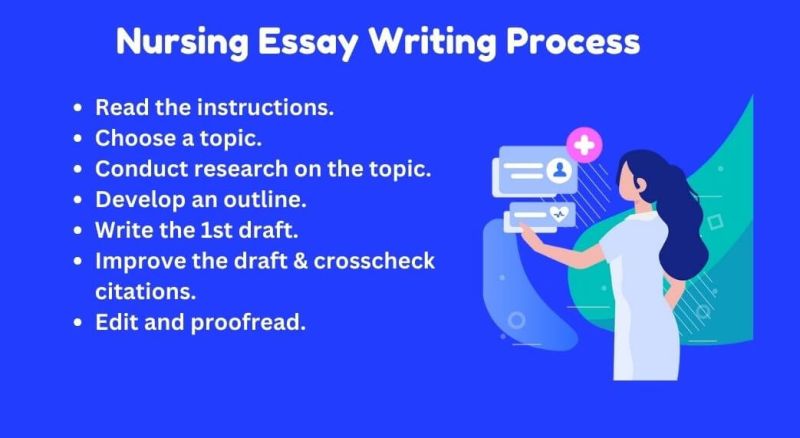

12 Effective Strategies for Nurse Essay Writing
Writing a nursing essay can be both challenging and rewarding. As a nursing student, you must demonstrate a deep understanding of the profession, apply critical thinking, and convey your ideas. Mastering nurse essay writing techniques for academic success is important. This guide will take you through the process of writing an effective nursing essay, from defining what a nursing essay entails to offering examples and tips for writing a compelling introduction and conducting a critical analysis.
What Is a Nursing Essay?
A nursing essay is an academic paper focused on topics within the nursing field. It can cover many subjects, such as patient care, medical practices, ethical dilemmas, and healthcare policies. The main goal of a nursing essay is to showcase your knowledge, analytical abilities, and the application of theoretical concepts to real-world scenarios.
- Reflective Essays require you to reflect on your clinical experiences and analyze how they have contributed to your professional growth.
- Argumentative Essays: These present a well-reasoned argument on a specific nursing issue, supported by research and evidence.
- Descriptive Essays: These provide a detailed description of an aspect of nursing, such as a procedure, patient care, or healthcare environment.
- Expository Essays: These explain a concept or process in nursing, offering thorough information and analysis.
Structure to use in nurse essay writing
A well-structured nursing essay typically comprises the following sections:
a). Introduction
The introduction sets the tone for your essay and captures the reader’s attention. It provides an overview of the topic and outlines the essay’s purpose.
The introduction establishes the foundation for the assignment by offering background information on the topic, presenting the purpose or thesis statement, and outlining the main points to be addressed. It should engage the reader and provide a clear context for the discussion on patient care.
Start your essay with a compelling introduction that engages the reader. Begin by highlighting the importance of the topic within the nursing field and present your thesis statement or central argument in nurse essay writing.
An effective introduction should not only introduce the main subject or question but also provide a brief overview of its significance in nursing. Nursingbuddie.com will help you improve your nurse essay writing skills.
Consider including a personal connection to the subject if relevant. Conclude the introduction with a clear, concise thesis statement that outlines the primary focus of your essay, providing a roadmap for the sections to come.
The introduction aims to introduce your essay topic and provide essential background information. It should outline the rationale for your paper and emphasize its relevance to the nursing field.
Start with a compelling hook, such as a provocative question, surprising statistic, or a notable quote from a healthcare professional, to engage the reader. The introduction should be concise yet informative, giving your essay a brief overview.
The concluding sentence of your introduction is your thesis statement. This statement is crucial as it presents your stance on the topic and summarizes the main points you’ll address. A strong thesis statement should answer the essay question and present a claim that invites debate.
Here are examples of effective thesis statements :
- The global shortage of nurses impacts patient satisfaction, mortality rates, and overall care quality, necessitating increased investment in the nursing workforce.
- Amnesia is a particularly dangerous condition because it impairs memory retention, complicates learning new information, and creates false memories.
b). Literature Review
In this section, you explore existing research, theories, and evidence related to your topic. A literature review demonstrates your understanding of the subject matter and informs your arguments.
c). Main Body
The essay’s main body is where you present your arguments, analysis, and critical thinking. Break down your topic into subtopics or key points, and support them with evidence, examples, and relevant data.
The essay’s body elaborates on the key points introduced in the introduction. Each paragraph focuses on a specific aspect of the topic, providing evidence, examples, and analysis to support the central argument. Organizing the content logically—through comparison/contrast, thematic grouping, or chronological order — enhances coherence and ease of reading.
In the body of your essay, offer background information that places the issue or topic within the broader context of nursing practice, education, or research in nurse essay writing . Identify and discuss the key points related to your thesis, such as nursing interventions, patient care strategies, ethical considerations, or research findings.
Each point should be supported by credible evidence from nursing journals, textbooks, clinical experiences, and scholarly articles. Go beyond merely presenting evidence; analyze and interpret it to demonstrate its relevance and implications for nursing practice or policy.
Structure your body paragraphs so that each focuses on a different aspect of your argument. Begin each section with a clear topic sentence, followed by evidence and examples that support your point. Ensure all external information is properly cited.
The main body of your nursing essay is where you justify your thesis statement with well-structured arguments. Each issue should be addressed in its paragraph, starting with a topic sentence that presents your viewpoint.
Follow this with supporting evidence, discussion, and a concluding sentence related to your thesis. Avoid including irrelevant information just to meet the word count; focus on maintaining high quality throughout. Nursingbuddie.com will equip you with strategies for excellent nurse essay writing.
d). Conclusion
The conclusion summarizes the main points discussed in the essay. It reinforces your thesis statement and leaves a lasting impression on the reader. Avoid introducing new information in the conclusion.
The conclusion summarizes the crucial findings and arguments about patient care, restates the thesis, and offers closing insights or recommendations. It should leave a lasting impression on the reader while underscoring the topic’s significance.
Additionally, the conclusion might identify areas for future research or suggest implications for nursing practice, education, or policy.
Wrap up your essay by summarizing the key arguments in the body, emphasizing their significance in nursing. Reflect on the broader implications of your findings for nursing practice, education, or research.
End with a thought-provoking statement or call to action that encourages further exploration or discussion in the nursing community. This is your opportunity to leave a lasting impression, so restate your thesis and main points, discuss the wider impact of your findings, and provide suggestions for future research. Conclude with a statement that inspires your reader to think critically about the topic.
In the conclusion, restate your thesis statement and summarize the main arguments from the essay’s body. Offer further recommendations related to the topic and frame your conclusion to reinforce the significance of your findings in the nursing field.
The conclusion should not introduce new concepts or opinions but should emphasize the key points made in your essay. This is your final opportunity to convince the reader of the strength and validity of your argument.
e). References
Properly cite all sources used in your essay. Follow a consistent citation style (such as APA, MLA, or Chicago) to give credit to the original authors and allow readers to verify your information.
List all references cited in your essay, following the citation style required by your instructor or institution (e.g., APA, AMA). As a nursing student, you need to understand how to cite sources correctly in nurse essay writing.
f). Proofreading and Editing Tips
After completing your essay, it’s essential to proofread and edit thoroughly. Grammar, punctuation, and spelling errors can significantly impact the clarity of your work. Avoid using first-person pronouns such as “I” or “we” to maintain a formal tone. Ensure all statistics, statements, and ideas are presented academically and properly cited to avoid plagiarism.
Take the time to review your essay carefully, checking figures, tables, and graphs for accuracy and relevance. Evaluate your essay’s readability and overall appeal, ensuring consistency and effectiveness in your analysis.
By following these proofreading and editing tips, you can enhance the quality of your nursing essay and achieve a strong grade. This guide will streamline your writing process and produce an outstanding nursing essay. Understanding the importance of research in nurse essay writing is crucial.
Nursing Essay Introduction Example
Consider the following nursing essay introduction as an illustration:
Nursing is a dynamic field that requires a blend of compassion, critical thinking, and clinical expertise. Nurses are essential in delivering high-quality care and enhancing patient outcomes as the healthcare landscape evolves. This essay delves into the pivotal role of nurses in contemporary healthcare, highlighting the importance of evidence-based practice and ethical considerations.
Demonstrating Critical Thinking in Nursing Essays
Critical thinking is essential for nursing practice. Here are some tips to showcase your critical thinking skills in your essay:
Critical thinking is crucial for effective nursing practice. Here are some strategies to highlight your critical thinking skills in your essay:
a) Analyze Scenarios
Present and critically evaluate real or hypothetical situations. Explore different perspectives and possible outcomes.
b) Evaluate Evidence
Effective transitions in nurse essay writing and supporting your arguments with evidence-based research are vital. Assess the quality and relevance of your sources critically.
c) Reflect on Practice
Share how your clinical experiences have shaped your nursing understanding and approach. Reflect on challenges, successes, and lessons learned.
d) Challenge Assumptions
Question common assumptions and consider alternative viewpoints.
By demonstrating a deeper understanding of the topic, you enhance the credibility of your essay.
Nursing Student Essay Example (Reflective Essay)
Demonstrating a deeper understanding of the topic enhances the credibility of your essay., example 1: reflective essay.
During my clinical placement in a bustling hospital ward, I worked with a patient experiencing chronic pain. My experience underscored the significance of holistic care, which addresses the physical and emotional dimensions of a patient’s well-being.
By applying effective pain management strategies and offering emotional support, I enhanced the patient’s comfort and overall quality of care.
Example 2: Argumentative Essay
The establishment of nurse-led clinics has notably improved patient access to healthcare services. This essay argues that broadening the scope of practice for nurses can enhance healthcare delivery efficiency, shorten waiting times, and offer more comprehensive care. Recent studies support nurse-led clinics’ positive effects on patient satisfaction and health outcomes.
Effective Strategies for Writing an Outstanding Nursing Essay
Writing a compelling nursing essay can be challenging, especially when you’re pressed for time and juggling multiple responsibilities. Many students in the UK seek nursing essay help for this very reason.
However, with the following strategies, you can produce an excellent essay quickly, whether you’re a nursing student with a busy schedule or a practicing nurse looking to refine your writing skills.
Understand the Essay Requirements
Each nursing program has its guidelines and expectations for essays. It’s crucial to follow these instructions carefully. You may need to adhere to specific word limits or respond to a particular prompt. Paying close attention to the details ensures you meet the criteria and avoid disqualification.
Plan Your Essay Thoughtfully
A well-structured essay is key to gaining admission to your desired nursing program. Start by outlining your main points, focusing on your qualifications, personal experiences, and a compelling introduction.
Organize your thoughts to ensure clarity and coherence. Your essay should communicate who you are and why nursing is your chosen path. Creating a persuasive nurse essay writing outline will help maintain focus and consistency throughout your writing.
Make Your Essay Stand Out
Admissions committees read numerous essays, so it’s important to distinguish yours. Share personal experiences that highlight your character and passion for nursing. Develop strategies for time management in nurse essay writing.
Use creative language and storytelling techniques to engage the reader and demonstrate your ability to connect with patients. Instead of merely stating why you want to attend a particular school, show them why you belong there.
Clearly State Your Goals
It’s important to convey your long-term career goals to achieve your dream of becoming a nurse. For instance, you might mention your intention to specialize in pediatric care or become an advanced practice registered nurse (APRN). Admissions committees value specific and well-defined objectives, reflecting your dedication to nursing.
Structure Your Essay Properly
Every nursing essay should have three essential components:
- An introduction that outlines your approach to the essay question.
- A body that develops your ideas logically, with smooth transitions between paragraphs.
- A conclusion that summarizes your findings and ties everything together. Ensure your essay consistently addresses the prompt and supports your arguments with relevant information.
Use Clear and Concise Language
Clarity is crucial in a nursing essay. Use straightforward language to convey your ideas, avoiding jargon or overly technical terms. This will make your essay more readable and accessible to a wider audience. Consider seeking professional help to ensure your writing is clear and effective if needed.
Show Compassion for Others
Nursing is a profession rooted in compassion and care. Highlight your empathy by sharing examples of selfless acts, whether toward strangers or loved ones. Convey your passion for helping others, as this quality is essential for success in nursing.
Edit and Proofread Carefully
Before submitting your essay, ensure it is free of errors by thoroughly editing and proofreading. Eliminate any typos, grammatical mistakes, or inconsistencies. Consider seeking feedback from teachers or peers to enhance the overall quality of your work.
How to Begin Nurse Essay Writing
Now that you have a clear understanding of what a nursing essay entails, let’s explore how to start writing one effectively and efficiently.
i). Brainstorm and Choose a Topic
Consider areas you’re curious about. Is it the influence of technology on patient care outcomes? Or perhaps the ethical dilemmas surrounding end-of-life care?
ii). Conduct Preliminary Research
Once you’ve selected a topic, dive into some initial research. For example, if patient falls interest you, you might uncover a research gap in fall prevention strategies within pediatric units.
iii). Write a Strong Thesis Statement
Your thesis is the foundation of your essay, clearly outlining your central argument. For instance, instead of writing, “This essay will discuss patient falls,” opt for a more assertive statement like, “Implementing a comprehensive fall prevention protocol can significantly reduce patient falls in pediatric units.”
iv). Create an Outline
An outline allows you to organize your thoughts and ensures your essay flows logically. Break down your essay into key points supported by evidence.
v). Gather Credible Evidence
Seek out peer-reviewed articles, nursing journals, and reputable online sources. Make sure your research is from credible and recent sources.
Organize Your Nursing Essay
Before you start writing, take a moment to organize your nursing essay. Identify the main points you want to convey and plan their structure. A well-organized essay flows smoothly, keeping the reader engaged throughout.
An outline can be particularly helpful in keeping your thoughts organized and ensuring that your ideas are presented in a logical sequence. Develop a clear argument in nurse essay writing.
Begin with an engaging introduction that captures the reader’s interest and provides an overview of your essay. Then, outline the body paragraphs where you’ll delve into your nursing experiences, motivations, and goals. Conclude with a strong closing that reinforces your key points and leaves a memorable impression.
i). Highlight Your Uniqueness
Your nursing essay is your chance to stand out and showcase what makes you unique. Reflect on your experiences, strengths, and passions, and consider how they align with your nursing aspirations.
Whether it’s a life event that inspired your interest in nursing, a special skill that sets you apart, or a personal quality that makes you an ideal candidate, be sure to highlight these aspects in your essay.
Admissions committees seek candidates who bring diversity and fresh perspectives to their programs. Don’t hesitate to let your personality and individuality shine through. Emphasize what makes you uniquely you and how these qualities will contribute to your success as a nursing student and future nurse.
ii). Express Your Aspirations
In your nursing essay, it’s essential to clearly express your aspirations within the field. Discuss your long-term career goals and how a nursing education will help you achieve them.
Whether you aim to specialize in a specific area, pursue advanced degrees, or serve underserved communities, paint a clear picture of your future. Highlighting your aspirations shows your commitment to nursing and your enthusiasm for making a meaningful impact on others’ lives.
Create an engaging narrative in nurse essay writing . Additionally, explain how the nursing program you’re applying to will support your goals and how you plan to leverage your education and experiences to achieve them. By articulating your aspirations with passion and clarity, you’ll leave a lasting impression on the admissions committee, showcasing your dedication to becoming an exceptional nurse.
iii). Demonstrate Your Compassion for Others
Nursing is a profession deeply rooted in compassion and empathy. Use your essay to demonstrate your genuine concern for the well-being of others. Share meaningful experiences where you’ve shown compassion, whether through volunteering, caregiving, or personal encounters. Discuss how these experiences have shaped your understanding of compassion’s importance in nursing and how you plan to incorporate it into your practice.
Highlight your ability to connect with patients, provide empathetic care, and advocate for their needs. By showcasing your compassion, you’ll illustrate your suitability for a nursing career and your commitment to making a positive difference in people’s lives.
iv). Clarify Your Credentials
In your nursing essay, it’s crucial to clearly outline your credentials and qualifications. Provide a brief overview of your academic background, including relevant coursework, degrees, and any certifications or licenses you hold. Highlight extracurricular activities, internships, or work experiences that have prepared you for a nursing career.
Emphasize any specialized skills or areas of expertise that set you apart from other applicants. If you need help with your personal statement for medical school, our experts can assist you in writing a compelling statement that showcases why you’re the perfect fit for their program.
v) Convey Your Motivation for Choosing Their Institution
Show the admissions committee why their nursing program is the ideal fit for you. Research the institution thoroughly and identify specific aspects that appeal to you, such as the curriculum, faculty expertise, clinical opportunities, or campus culture. Explain how these elements align with your academic and career goals and why attending their institution will help you succeed as a nurse.
Whether it’s the program’s reputation, opportunities for hands-on learning, or the supportive community, convey your genuine enthusiasm for becoming part of their institution. By demonstrating your motivation and alignment with their program, you’ll strengthen your application and show your commitment to excelling in your nursing education.

vi). Seek Feedback on Your Essay
Improving nurse essay writing with peer reviews. Before submitting your nursing essay, seek feedback from a peer or mentor. Choose someone you trust to provide honest and constructive feedback on your writing. Ask them to review your essay for clarity, coherence, and persuasiveness, and consider revising based on their suggestions.
Additionally, ensure your essay effectively conveys your personality , experiences, and aspirations. Does it capture who you are as a candidate for their nursing program? Incorporating feedback from a peer can help you refine your essay and ensure it makes a strong impression on the admissions committee. Incorporate feedback into nurse essay writing revisions.
Sample nursing essay
End-of-life care is a complex and emotionally charged aspect of nursing, often presenting nurses with challenging ethical dilemmas. As patients approach the end of their lives, nurses must navigate conflicting values such as patient autonomy, beneficence, nonmaleficence, and justice. This essay explores the key ethical challenges nurses face in end-of-life care and discusses strategies for addressing these issues while maintaining the principles of ethical nursing practice.
A central ethical dilemma in end-of-life care is balancing patient autonomy with beneficence. Patients nearing the end of life often express their preferences regarding treatment, such as declining life-sustaining measures like mechanical ventilation or cardiopulmonary resuscitation.
While nurses are obligated to respect patient autonomy, they must also consider beneficence, which requires acting in the patient’s best interest. Determining what constitutes the patient’s best interest can be difficult, particularly when their wishes conflict with medical advice or societal norms.
Family dynamics further complicate end-of-life care, as disagreements among family members about treatment decisions, goals of care, or the withdrawal of life support can arise.
Nurses may find themselves mediating these conflicts , striving to facilitate communication and achieve consensus while ensuring that the patient’s wishes are respected. Managing these disputes while maintaining the patient’s comfort and dignity presents significant ethical challenges for nurses.
Another ethical dilemma involves ensuring effective symptom management in end-of-life care. While symptom relief is crucial for enhancing patient comfort and quality of life, achieving it may require interventions that carry risks or side effects.
Nurses must carefully weigh the benefits and potential harms of treatment options, taking into account the patient’s preferences and goals of care. Striking a balance between symptom relief and minimizing harm can raise ethical questions that nurses must address thoughtfully.
Cultural and religious beliefs also play a significant role in end-of-life care, shaping patients’ views on death, dying, and medical interventions. Nurses must be sensitive to these cultural and spiritual considerations, ensuring that care aligns with the patient’s values and beliefs.
However, cultural and religious diversity can lead to differing viewpoints among patients, families, and healthcare providers, requiring nurses to navigate these differences with ethical sensitivity and respect.
To effectively address these ethical dilemmas, nurses must engage in clear communication with patients and families, collaborate with interdisciplinary teams, and seek ethical reflection and consultation when needed.
By upholding the principles of patient autonomy, beneficence, nonmaleficence, and justice, nurses can navigate the complexities of end-of-life care with compassion and integrity, ensuring that care aligns with the patient’s values, preferences, and goals.
In conclusion, end-of-life care presents nurses with numerous ethical challenges that demand careful consideration and informed decision-making. By recognizing these challenges and applying ethical principles in practice, nurses can provide compassionate, patient-centered care to those nearing the end of life, honoring their dignity and autonomy throughout the dying process.
FAQs about Nursing Essays
How do you write an introduction for a nursing essay.
To write an engaging introduction for a nursing essay, start by providing background information on your topic to establish context. Outline the purpose of your essay and briefly mention the key points you will cover.
Incorporate case studies into nurse essay writing. Consider capturing the reader’s interest with a thought-provoking question, a relevant statistic, or a compelling anecdote related to nursing practice. Focus on clarity and conciseness while emphasizing the significance of the topic within the nursing field.
How Long is a Nursing Essay?
The length of a nursing essay typically ranges from 1,500 to 3,000 words, depending on the assignment requirements and the complexity of the topic. The specific word count may vary based on your academic level and the guidelines provided by your instructor or institution.
It’s important to adhere to any given word count while ensuring that your ideas are conveyed effectively, maintaining clarity and coherence throughout the essay.
How Do You End a Nursing Essay?
To conclude a nursing essay, summarize the key points discussed in the body and reinforce the significance of your findings in relation to nursing practice or theory. Also understand how to handle complex topics in nurse essay writing .
Avoid introducing new information in the conclusion; instead, provide insights or suggest directions for further research or action. End with a strong closing statement that leaves a lasting impression on the reader, highlighting the importance of the topic and your analysis.
How Do You Write a Nursing Essay?
To write a nursing essay , follow these steps:
- Understand the assignment requirements.
- Choose a relevant and engaging topic.
- Research reliable sources and take notes on key points.
- Create an outline with an introduction, body, and conclusion.
- Begin with a hook and a clear thesis statement.
- Develop clear, well-organized paragraphs supported by examples.
- Summarize the main points in the conclusion.
- Review your essay for clarity and coherence.
- Proofread to eliminate errors.
Writing a High-Quality Nursing Essay: Essential Questions and Tips
To write an informative and well-structured nursing essay , consider the following questions provided by our nursing essay writing service. These will help you assess your knowledge and build confidence in your writing:
- Do you have a strong grasp of the fundamentals of nursing practice?
- Are you thoroughly familiar with the essay topic?
- Can the proposed reforms or initiatives be practically implemented?
- Can you connect the essay’s content with key nursing theories?
- Are you able to present strong arguments and draw meaningful conclusions?
- What impact could your work have on the nursing field?
- If given a second chance, what changes would you make to your essay?
- Are you satisfied with the final outcome?
With these questions in mind, plan your writing process carefully, paying attention to every detail. This checklist will help you align your work with your instructor’s expectations. Before you start writing, take time to consider your topic, the arguments you’ll present, and how you’ll explore the theme. Incorporate clinical experiences into nurse essay writing.
Remember, a nursing essay should be grounded in evidence-based practice to enhance decision-making in patient care. The next section will guide you through writing an effective and impactful nursing essay.
Choosing the Right Topic for a Nursing Essay
Given the complexity of nursing practice, you have a wide array of topics to choose from. However, your goal should be to select a competitive and original topic that explores various aspects of a particular disease, health reform, clinical practice, or global health issue. If your professor hasn’t assigned a specific topic, you’ll need to develop one yourself. Here’s how to choose a compelling topic:
Be Critical
Avoid letting personal biases influence your topic selection. Aim for objectivity and choose a topic that offers multiple perspectives. For example, if you’re writing about benchmarking data for nursing productivity , don’t just focus on the positive aspects. Instead, provide a balanced view that examines all potential impacts of benchmarking on nursing performance.
Stay Open-Minded
Don’t limit yourself to a specific area of nursing practice. In nurse essay writing, have strategies for developing strong arguments. This field covers numerous fascinating and underexplored healthcare issues, diseases, and reforms.
Be willing to consider a variety of ideas before settling on a topic. For instance, instead of quickly choosing to write about the role of nurses in clinical practice, you might explore more complex themes like the medical risks associated with adolescent pregnancy.
Practice Cultural Competence
Select a topic that is respectful of the diverse cultural backgrounds of your audience. Be mindful of how you approach sensitive issues. For example, if you plan to write about a global health issue like AIDS, avoid framing your topic in a way that could be harmful or offensive.
Instead, align your topic with the principles of the Nursing Code of Ethics. You could reframe the topic to focus on the connection between unprotected intercourse and the rising incidence of AIDS.
By keeping these principles in mind, you’ll be better equipped to choose a suitable topic and write a nursing essay that is both insightful and respectful.
If you approach selecting an essay topic with a critical, open-minded, and culturally competent perspective, you’re more likely to develop a theme that fosters meaningful discussion. Below is a list of potential themes to help you organize your thoughts and inspire your own topic ideas:
- Cultural Sensitivity in Advanced Nursing Practice
- Managing Ethical Dilemmas in Nursing
- The Relationship Between Patronage and Patience in Pediatric Care
- Simple Regression Analysis in Healthcare Settings
- The Role of Professional Status in Nursing Achievements
- The Alarming Rise of Infectious Diseases as a Global Health Concern
- The Importance of Informed Consent in Quantitative Research
- Leadership in Nursing Practice
- Palliative Care and Nursing Advocacy
Key Aspects of Nurse Essay Writing
To excel in your nursing course, it’s important to focus on the key aspects of essay writing. Review the fundamental principles of nursing essay composition before developing your topic.
Evaluate Your Evidence Like a Pro
When writing your essay , your arguments and recommendations should be grounded in practice-based evidence. It’s crucial to evaluate this evidence thoroughly, as it may be disputed due to limited resources or effectiveness. Evidence in your essay must be authoritative and reliable, rather than simply opinion-based or speculative.
Additionally, it’s essential to critically assess and make informed judgments about the evidence you use. For instance, while evidence from patient experiences can provide insight into their feelings, it might not offer guidance on the most suitable care approach.
Statistical evidence, on the other hand, may help identify specific cause-and-effect relationships, informing how care should be structured. However, not all evidence comes from robust studies, and some may be stronger than others.
Therefore, you should establish a clear connection between the evidence and nursing practice before incorporating it into your essay . Critically evaluate the authority, consistency, and relevance of the evidence to determine its suitability for your topic.
Understanding Different Types of Evidence
Distinguishing between evidence from research and experiments is crucial in nursing essays, as various research designs influence the nature of evidence differently. Know how to use evidence in nurse essay writing.
Classifying evidence helps you organize your reflections and observations more effectively. For example, experiential evidence is valuable in healthcare because it analyzes case studies and relates them to risk management. You can use this type of evidence to examine cases and identify errors or misinterpretations, thereby avoiding similar mistakes in your work.
The most reliable form of evidence comes from research, as it is carefully designed to remove bias and gather objective data. When selecting evidence for your nursing essay, ensure that it addresses the topic closely and thoroughly. Base your statements and arguments on authentic data, avoiding unsupported claims.
Judging the Evidence
Once you’ve gathered various types of evidence, it’s important to assess their merits. The evaluation process is closely linked to the research design. To determine the authority of the evidence, you should consider whether the research is ethical, reliable, and valid.
Additionally, evaluate whether the research methods provide sufficient and relevant information to meet the study’s objectives and answer its research questions. Ensuring that the design and findings are clear and unambiguous is essential for establishing the validity of the evidence. This critical assessment is key to determining the accuracy and completeness of the research findings in your nursing essay.
Writing a compelling nursing essay involves a blend of knowledge, critical thinking, and effective communication skills. By adhering to the guidelines provided in this guide, you can write a well-structured and insightful essay that demonstrates a deep understanding of the nursing profession. Nursingbuddie.com is here to teach you how to do effective nurse essay writing for nursing students.
Published by Simon
View all posts by Simon

- OUR SERVICES
- ORDER PROCESS
Main Services
- Dissertations
- Capstone Projects
- Research Proposals
- Research Papers
- Rewriting Services
Outstanding Help
- Live Assistance 24/7
- Genuine Research Experts
- Highest Scholarly Standards
- 100% Confidential
- 100% Plagiarism Free
- Secure Payment

The Best Research Consultants

Expert Data Analysis Services

Guaranteed Satisfaction

Literature Review Experts

Academic Project Writing Experts

Professional Nursing Writers
- DISSERTATIONS WRITING Dissertations Writing Thesis Writing Capstone Writing Research Proposals
- COURSEWORK WRITING Assignments Writing Coursework Writing Research Papers Writing Lab Reports Writing Speech Writing Help
- PAPER REVIEW HELP Paper Editing Paper Proofreading Paper Rewriting Paper Paraphrasing Formatting & Structuring Assistance
- ADMISSION PAPERS HELP Admission Essays Statements Of Purpose Personal Statements CV & Resume Writing Cover Letter Help
Writing a Nursing Essay Like an Expert
An essay is written to present facts, opinions, and ideas about a particular topic. When writing a nursing essay, one is expected to convey their point of view, opinion, or perspective in a given issue to demonstrate knowledge, expertise, and experience in the nursing practice. The focus of nursing essays is on topics related to nurse practitioners, patient-centered care, health policy, or healthcare systems. Such essays may be descriptive, argumentative, comparative, problem-solution oriented, critical reviews, exploratory, explanatory, or instruction-based.
An effective step-by-step guide for writing a nursing essay is essential for helping students successfully submit well-written, organized, and structured essays at different levels of their nursing education. Writing nursing essays entails translating specialized knowledge, skills, training, objectivity, and rigorous research into meaningful, informational, and educative resources for practitioners in the nursing field and clinical practice.
The step-by-step guide provided in this article can help students to showcase their knowledge and understanding on a particular topic and the ability to communicate ideas effectively. Students who may lack enough time or resources to complete and submit their essays within the given timelines can hire professional nursing essay writers from credible companies for the best help while they concentrate on other demands of the program.

Ten Steps to Follow When Writing Nursing Essays
Nursing essays require thorough research, expertise in writing and referencing styles, scientific accuracy, and application of technical knowledge to attain the required standards. To write a nursing essay that communicates ideas effectively, one can break the process into logical steps and organize it into an introduction, body paragraphs, and a conclusion. The contents of the introduction, body paragraphs, and conclusion depend on the nursing essay themes that the author wishes to discuss or the prompts/questions provided. The steps include:
Step 1: Understanding the requirements, prompts, instructions, and guidelines
Before one can start writing essays and other academic documents, it is fundamental to read the requirements of the assignment carefully to ensure strict compliance. The writer may be asked to respond to a prompt following specific guidelines such as the type/nature of the nursing essay topics to address, word count, the required citation style, and submitting instructions. Reading and understanding the specific requirements, purpose to be accomplished, and expectations of the target audience help in ensuring compliance and increases one's chances for admission to the nursing program or success in achieving the purpose for which the essay was written.
Step 2: Choosing the right topic for the nursing essay
If the topic is not provided as part of the requirements, one ought to choose based on the purpose they want to accomplish and their interest in the nursing profession. The topic should be relevant to the specific reader's interest and with an appropriate scope or focus to facilitate compliance with the word count requirements while including all the information/details needed for a complete argument. To choose an appropriate nursing essay topic, one ought to think of the educated audience they are targeting and figure out what could be appealing to them to increase their chances of acceptance.
Step 3: Conducting research on the chosen nursing topic
After choosing the most appropriate topic, one ought to conduct rigorous research to identify credible sources; academic and scientific articles, or medical periodicals from which to fetch evidence for the essay. Hiring a credible nursing writing service can help to complete a well-researched essay backed up by credibly sourced citations within a fast turnaround time. While conducting the research, one should keep a record of the relevant material obtained from the sources and databases such as PubMed, JBI EBP database, CINAHL Complete, ClinicalKey Nursing, and the Nursing Reference Center among others to make the preparation process of the list of references or bibliography easier.
One should use credible sources such as academic and scientific articles and medical periodicals that are current or published within five years, relevant, authoritative, accurate, and reliable in accomplishing the purpose of the nursing essay.
Step 4: Preparing the nursing essay outline
An outline acts as the blueprint on which to base the nursing essay structure and organize the information for effective flow and transition while keeping track of the main points throughout the body paragraphs. The essay is organized into:
- An appealing introduction that tells readers what the essay is about and how one aims to explain the prompt/question or meet the professional standards, expectations, and requirements.
- The body paragraphs contain a logical progression of arguments aimed at achieving specific objectives based on the type of nursing essay being written.
- The conclusion provides a brief summary of the main points/arguments presented in the essay.
In each paragraph of the nursing essay, the writer must strictly comply with the word count, tone, and style requirements of the field.
Step 5: Writing the nursing essay introduction
The first sentence of the introductory paragraph is aimed at informing the reader of the subject matter, followed by the background information and rationale of the chosen topic. The section should pull in readers, draw their attention, and engage them in relevant scholarly conversation with respect to the topic, nursing field, or clinical practice. After the nursing essay definition and introducing the reader to the topic of discussion, the paragraph should also provide an excellent thesis statement. A thesis statement tells readers what the essay is about with clarity, precision, conciseness, and specificity.
To write a nursing essay effectively, one should ensure that the thesis statement aligns with the topic and that the body paragraphs contain sufficient supporting information. A one-sentence transition to the other paragraphs may be used to indicate the end of the introduction.
Step 6: Writing the nursing essay body
The nursing essay body is organized in paragraphs. Each body paragraph contains one topic sentence followed by other supporting sentences. Each paragraph should present only one idea; containing information that is relevant to the thesis statement. The topic sentence introduces the reader to the main focus/idea of the paragraph. The supporting sentences ought to be directly related to the topic sentence; providing specific details regarding the subject matter, stating nursing essay examples, facts, reasons for writing the essay, and any other relevant information based on the context and objectives of the nursing student or professional.
The number of paragraphs depends on the required word count, the purpose, and the nature of the essay. A transition sentence can be used to ensure logic in the flow of information from one paragraph to another and ease the comprehensibility of the academic document. Seeking online help to write a professional nursing essay can assist when one is not in a position to complete their own essay.
Step 7: Writing the nursing essay conclusion
Like other academic essays, a nursing essay ought to have an effective concluding section, which may be a one-sentence summary or a brief paragraph to wrap up the main points or arguments presented in the body paragraphs. The conclusion entails restating the thesis of the nursing essay and providing suggestions/recommendations, predictions, or opinions related o the nursing topic in an interesting and memorable language to leave the target audience with a positive lasting impression.
The introduction and the conclusion paragraphs ought to be related in a way that reminds the reader of the main points of the essay. One should ensure that the conclusion contains information relevant to the nature of the nursing essay and does not introduce any new ideas to the document. Professional nursing essay writers who are highly qualified, experienced, and from credible companies like ours can assist students and nurses in completing the task before the deadline at affordable rates.
Step 8: Citation of sources
All the sources used in developing the nursing essay must be correctly cited according to the specified style guide requirements to avoid plagiarism issues. Depending on the type and nature of the nursing essay, a list of references that matches the in-text citation may be included at the end of the document. Strict compliance with the standards and requirements of academic writing is fundamental for the successful submission of a nursing essay.
Step 9: Editing and revising the first draft of the nursing essay
After writing the first draft based on information obtained from researching the topic, it is essential to edit it to improve the quality of the nursing essay. The editing process may involve removing or adding information, changing sentence structures, and reorganizing the content of the essay. Based on the quality of the draft, one may conduct content/structural editing, line, or copy editing.
Step 10: Proofreading
Once the author is satisfied with the final essay draft, it should be proofread to detect and correct grammar, spelling, and punctuation errors, formatting and style inconsistencies, plagiarism, and any other mistake that can affect the quality and impact of the nursing essay on the decision of target audience. The final essay ought to be well-defined, properly structured, flawless, and of high quality.
Considering the steps discussed in this article can help nursing students in writing the best essays to educate the society they are serving and demonstrate the ability to communicate their viewpoints, perspectives, and opinions on nursing, clinical practice, and healthcare-related issues with professionalism, clarity, and effectiveness. Whenever the need arises, one can seek online help to write a professional nursing essay while focusing on other commitments and responsibilities such as other class assignments, practical examinations, or patient care.

- Aeronautics
- Computer Studies
- Cultural Studies
- Engineering
- Information Systems
- International Relations
- Literature Review
- Political Science
- Programming
- Social Science
- Biochemistry
- Chapter 1: Thesis Introduction
- Chapter 2: Thesis Literature Review
- Chapter 3: Thesis Research Methods
- Chapter 4: Thesis Results & Data Presentation
- Chapter 5: Thesis Discussions & Analysis
- Chapter 6: Thesis Conclusion & Recommendations
- Lost your password?

- APA Referencing Help
- Harvard Referencing Help
- MLA Referencing Help
- Chicago Referencing Help
- Privacy Policy
- Terms & Conditions
- Client's Testimonials
Academic Assignments Help
Academic Writing Service
Accounting Papers
Annotated Bibliography Help
Anthropology Papers
APA Literature Review Help
Best Papers
Business Papers
Buy Dissertation
Buy Original Essay
Buy Research Paper
Buy Term Paper
Capstone Proposal
Case Study Writing Help
College Essay
College Papers
Critical Essay
Article Review Help
Custom Essay
Custom Essay Writing
Custom Papers
Custom Research Paper
Custom Term Paper
Custom Thesis
Customized Essay Help
Descriptive Essay Help
Dissertation Abstract
Dissertation Proofreading Help
Dissertation Proposal
Dissertation Topics
Dissertation Writers
Dissertation Writing Tips
Do My Essay
Do My Paper
Do My Report
Cover Letter Help
Doctoral Dissertation
Education Papers
Essay Writing Tips
GIS Assignment assistance
Graduate Essay
Graduate Papers
Help Develop Thesis Topics
Information Management Systems
Management Papers
Master's Thesis
Medical Papers
Non-Plagiarized Essay
Nursing Papers
Persuasive Essay Help
Philosophy Papers
Position Papers Help
Professional Thesis Writers
Powerpoint Presentation Help
Proposal Writing Tips
Qualitative Thesis/Dissertation Help
Quantitative Thesis/Dissertation Help
Research Paper Topics
Science Papers
Statistical Analysis Using SPSS Help
Term Paper Help
Thesis Hypothesis Help
Thesis Proposal
Thesis Rationale Help
Thesis Writers
Thesis Writing Tips
UK English Native Writers
University Essay Help
University Papers
US English Native Writers
Write My Paper
Book Report Writing Assistance

How to Write a Nursing Essay Introduction with Examples
The introduction is a vital component of your nursing essay, serving as a roadmap for your reader and setting the stage for the arguments and evidence you’ll present throughout your paper. In this comprehensive guide, we’ll explore the key elements of a strong nursing essay introduction and provide practical examples to help you craft an engaging opening that captures your reader’s attention.
Identify Your Essay’s Purpose and Scope
Before you begin writing your introduction, take a moment to clarify the purpose and scope of your essay. Consider the specific question or prompt you’re addressing, and identify the key themes, arguments, or concepts you plan to explore. This will help you create a focused, purposeful introduction that effectively orients your reader.
Example: “This essay aims to explore the critical role of effective communication in providing high-quality patient care within the nursing profession. By examining the importance of active listening, clear and concise language, and adaptability to individual patient needs, we will demonstrate how strong communication skills can foster trust, improve patient outcomes, and enhance the overall healthcare experience.”
Provide Relevant Background Information
Next, provide your reader with any relevant background information they’ll need to understand the context and significance of your topic. This might include a brief overview of key concepts, historical developments, or current trends in the field of nursing. Be sure to keep your background information concise and directly relevant to your essay’s main focus.
Example: “Effective communication has long been recognized as a cornerstone of high-quality healthcare. In the nursing profession, where direct patient interaction is a central aspect of the role, the ability to communicate clearly, empathetically, and adaptively is particularly crucial. As the healthcare landscape continues to evolve, with increasing patient diversity and technological complexity, the importance of strong communication skills in nursing has only grown more apparent.”
Present Your Thesis Statement
The thesis statement is the core of your introduction, encapsulating your essay’s main argument or central claim. It should be clear, concise, and directly respond to the question or prompt at hand. Place your thesis statement near the end of your introduction to serve as a natural bridge into the body of your essay.
Example: “This essay argues that effective communication is a fundamental competency for nurses, essential for building trust, improving patient outcomes, and navigating the challenges of an increasingly complex healthcare environment.”
Putting It All Together: A Complete Nursing Essay Introduction Example
“This essay aims to explore the critical role of effective communication in providing high-quality patient care within the nursing profession. By examining the importance of active listening, clear and concise language, and adaptability to individual patient needs, we will demonstrate how strong communication skills can foster trust, improve patient outcomes, and enhance the overall healthcare experience.
Effective communication has long been recognized as a cornerstone of high-quality healthcare. In the nursing profession, where direct patient interaction is a central aspect of the role, the ability to communicate clearly, empathetically, and adaptively is particularly crucial. As the healthcare landscape continues to evolve, with increasing patient diversity and technological complexity, the importance of strong communication skills in nursing has only grown more apparent.
This essay argues that effective communication is a fundamental competency for nurses, essential for building trust, improving patient outcomes, and navigating the challenges of an increasingly complex healthcare environment. Through a comprehensive analysis of key communication strategies and their practical applications in nursing, we will underscore the vital role that communication plays in ensuring the delivery of safe, compassionate, and patient-centered care.”
Expert Guidance for Crafting Compelling Nursing Essay Introductions
Ready to elevate your nursing essay with a powerful introduction? Our team of seasoned nursing writers is committed to providing the expert guidance and support you need to succeed. From helping you identify your essay’s core focus to crafting a compelling thesis statement, we’ll collaborate with you every step of the way to ensure your introduction sets the stage for a truly outstanding essay.
Don’t let the challenge of writing an effective introduction hold you back from achieving your academic and professional goals. Get in touch with us today to learn more about our nursing essay writing services and take the first step toward writing an introduction that engages your reader and sets your essay up for success. Together, we’ll create a nursing essay that showcases your unique voice, insights, and dedication to the field.
Leave a Reply Cancel reply
Your email address will not be published. Required fields are marked *
Post Comment
How to Write a Good Essay About Nursing Career
How to Write a Nursing Essay Conclusion with Examples
How to Write a Nursing Essay
How to Write a Winning Nursing Scholarship Essay

IMAGES